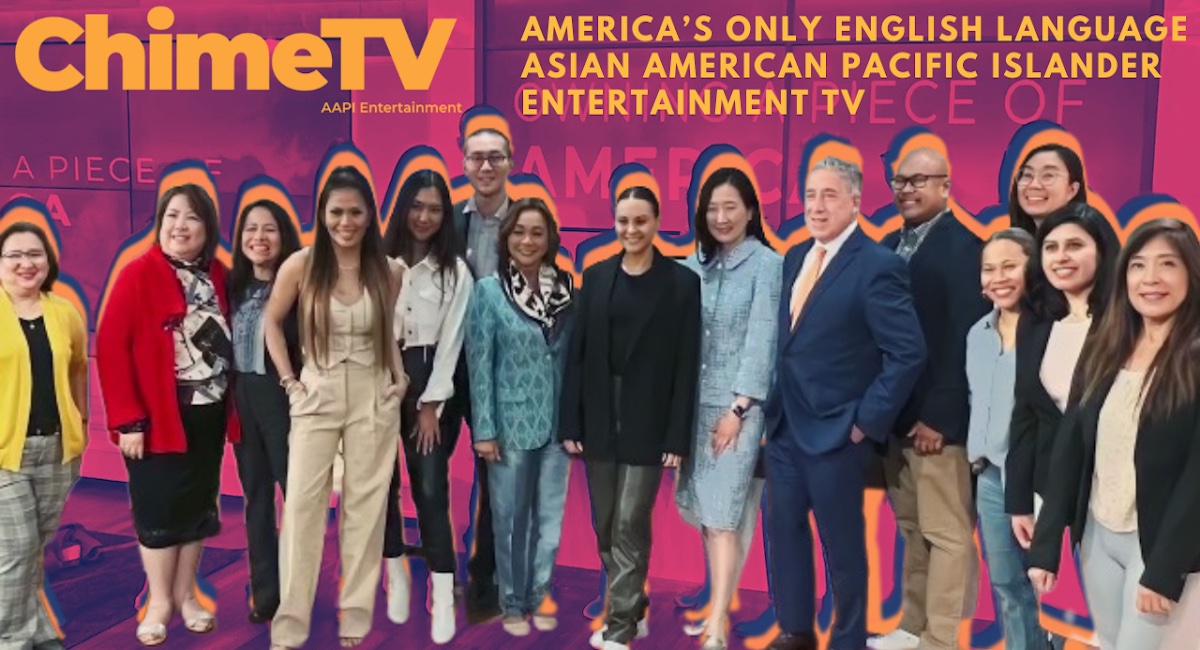ChimeTV, the first and only Asian-owned TV network showcasing Asian American Pacific Islander programming in English, rolled out across 41 states in January 2023.
Since founder Faith Bautista’s departure in June 2023, media mogul Takashi Cheng has been the platform’s top executive. Cheng — who in 2022 established Chime’s partner GoldenTV, the first streaming service focused on AAPI content — has been very vocal about his intention to tell stories across the AAPI diaspora which counter Asian hate.
“I was previously director of a production company, Whereabouts Unknown,” said Cheng. “By being extremely budget-conscious — using our own equipment to shoot in tax-incentive states, for example — nine out of ten films, many true-life, were financially successful; this was practically unheard of, even for major studios. When Stop Asian Hate gained ground, I saw fragmentation in our communities and underrepresentation of us in the mainstream media, so I turned that true-life lens upon them through GoldenTV.”
Crossing cultural lines
GoldenTV, the first streaming service focused on AAPI content, was launched six months before Chime, and was for it a major content provider. Their model, though shared, is unique: first to fund shows in English, specific to experiences of various Asian communities — Korean, Chinese, Japanese, Vietnamese, Thai, Filipino — and then to create content which joins these communities and crosses cultural lines.
“Key to Asian hate is that for much of our history, both sides viewed us as foreigners,” Cheng said. “When people tell you ‘Go back to China,’ well, you’re viewed as a foreigner there too. I’m all for in-language programming, but there’s a deep need for the alternative. Chime broadcasts in English to reflect the stories of cultural misfits with no home country, who may not speak a lick of their inherited language.”
“A lot of our fragmentation as foreigners owes to ignorance, but a lot also owes to media casting Asian-Americans in certain roles and representing some ethnicities far more than others — like Pacific Islanders,” he added.
Despite the fact that Asian Americans represent the fastest-growing ethnic group in America, disparities in entertainment representation persist. Of the 1,300 top-grossing films from 2007 to 2019, for example, 50 had AAPI directors and 44 depicted an AAPI lead or co-lead. Of those 44 films, only 6 were female.
Nevertheless, this trend is reversing.
A study published last February by the University of Southern California’s Annenberg Inclusion Initiative analyzed 1,600 of the top-grossing box office movies from 2007 to 2022. AAPI characters presented a sole and stark exception to the basically stagnant underrepresentation of nonwhite characters: Over 16 years, the percentage of Asian speaking roles soared from 3.4% in 2007 to 15.9% in 2022.
Engaging with AAPI communities
Since its start as the first Asian American-owned TV network in American history, Chime, which takes its name from an acronym for “Creating History in Media Entertainment,” has been aiding this representational reversal across genres — over 70% of which is new to U.S. audiences — including news, drama, comedy, food, travel, lifestyle and mixed martial arts.
Currently popular shows include “Slumfood Millionaire,” featuring dishes from the slums of southern and eastern Asia; “Lion Mums,” about the work-life balance and parenting troubles faced by Singaporean mothers; and “Dr. Nandi,” an Emmy-winning talk show by Indian gastroenterologist Partha Nandi melding spirituality and health.
Programs currently in development include a cross-cultural Asian comedian showcase; an entirely unscripted reality show with real members of LA’s Koreatown; and the first-ever AAPI news broadcast show in English.
“We invest far less money to market these shows for the sake of subscribers,” explained Cheng, “than we do the time to engage the communities these shows are about, to build trust and let them know our intentions aren’t to steal their (intellectual property) like many streamers and networks, but rather to position them as creators, and give them an equitable platform to share their stories.”
These barriers to equitable representation have been particularly underscored by the ongoing Writers and Screen Actors Guild strike, the biggest in Hollywood in six decades.
Given that work in writing and dialogue launched his entertainment career, “I’m sympathetic to the strike,” said Cheng. “It doesn’t affect ChimeTV a lot, given that much of our content now is unscripted, or martial arts- or music-heavy, but it does shed light on the need for trust that ChimeTV has to establish with creators — which has been destroyed by many streamers — in order to get their stories out there.”
The few unequivocal successes of AAPI representation recently achieved on this front — like the films “Crazy Rich Asians” and “Everything Everywhere All at Once” — take “not a single miracle but so many stars to align, from casting to the music to the director,” he noted, “but we’re so fragmented that many feel it’s their sandbox. If J. P. Morgan has X amount to their DEI budget, for instance, and 10 AAPI projects are applying for it, the end game is the same but it’s nearly impossible. If you combine 10 of those sandboxes, however, you have a beach.”
“That’s the message of Chime TV,” Cheng said. “Not to compete with the streamers; until we abandon our somewhat egotistical ambitions and work together, we’ll continue to displace ourselves. We push the same scarcity mentality on ourselves even though we all want the same thing — cementing a future for AAPI stories, giving us a visible platform — but none of us can have it alone. So why not work together?”
This report is supported in part by funding provided by the State of California, administered by the California State Library in partnership with the California Department of Social Services and the California Commission on Asian and Pacific Islander American Affairs as part of the Stop the Hate program. To report a hate incident or hate crime and get support, go to CA vs Hate.






